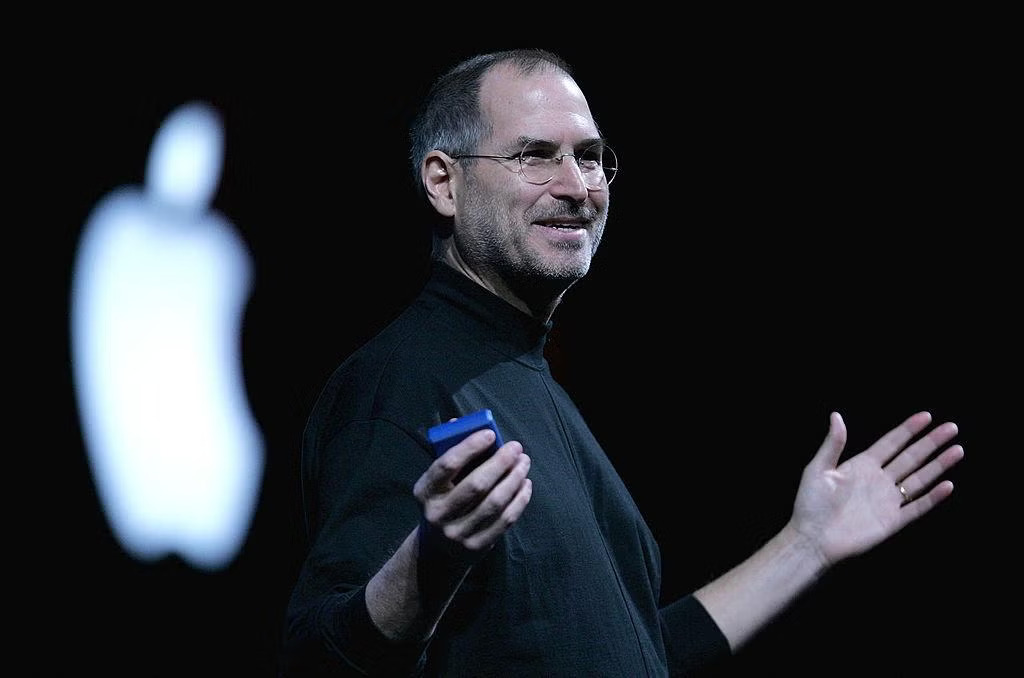The Personality of the Day series highlights individuals whose work, ideas, and achievements have made a lasting impact on the world. Each edition takes one influential figure and explains their life, contributions, and legacy. In today’s feature, we will be focusing on Steve Jobs who is one of the most transformative figures in the history of technology. Here is why Steve Jobs is remembered globally, what makes his contributions so significant, and how his life journey shaped modern digital culture. You will have a clear look at his career, family life, and the ideas he stood for.
Personality of the Day: Steve Jobs

Source: The Independent
Steve Jobs (Steven Paul Jobs) was an American entrepreneur and technology leader who was born on February 24, 1955. He co-founded Apple in 1976 with Steve Wozniak and Ronald Wayne and became widely known for combining hardware, software, and design in ways that changed personal computing, music players, phones, and digital publishing. Jobs also founded NeXT and played a key role in the early development of Pixar before returning to Apple and leading its revival in the late 1990s and 2000s.
The Disney Archives mentions: "He was born Steven Paul Jobs in San Francisco, California, on February 24, 1955, and was adopted at birth by Paul and Clara Jobs. His father, who never graduated high school and was a machinist by trade, was the first to sit Steve down at a workbench and show him how to use tools when Steve was 5 years old."
Why is Steve Jobs Famous? His Major Contributions
Steve Jobs is famous for several clear, widely documented reasons:
Co-Founding Apple and Popularising Personal Computers
Co-founding Apple and popularizing personal computers. Apple’s early machines — the Apple I and especially the Apple II — helped bring computing to small businesses, schools, and homes.
Championing Design and User-Focused Technology
Bringing design and user experience to the center of technology. Jobs pushed for simple, elegant product design and close integration of hardware and software — a philosophy that shaped the Macintosh, iMac, iPod, iPhone, and iPad.
Reviving Apple and Leading Its Modern Transformation
Reviving Apple after returning in 1997. After Apple struggled in the early 1990s, Jobs’s return led to a renewed product strategy, the iMac, the iTunes ecosystem, and later the iPhone — moves credited with making Apple one of the world’s most valuable companies.
Advancing Digital Media and Animation Through Pixar
Advancing digital media and animation. Jobs bought and supported Pixar, which produced hit animated films and changed the movie business before being sold to Disney.
Steve Jobs: Life, Career, and Family
Early Life and Background
Steve Jobs was born in San Francisco and adopted soon after birth by Paul and Clara Jobs. He grew up in the San Francisco Bay Area, where he developed an early interest in electronics and mechanics. Jobs briefly attended Reed College before leaving and later worked at Atari and explored spiritual ideas, including a trip to India.
Founding Apple and Early Success
In 1976 Jobs, with Steve Wozniak, built the Apple I and then the much more successful Apple II, which helped establish Apple as an early leader in personal computers. Apple went public in 1980, making Jobs and other early employees wealthy and well known.
Departure from Apple and NeXT/Pixar Years
After internal conflicts, Jobs left Apple in 1985. He founded NeXT, a computer company focused on high-end workstations, and purchased a small animation studio that became Pixar. Pixar went on to produce hit films and later merged with Disney, making Jobs a major shareholder.
Return to Apple and Later Achievements
Apple bought NeXT in 1996, bringing Jobs back into the company. As CEO, he oversaw the release of iMac, iPod, iTunes, the iPhone (2007), and the iPad (2010). His focus on product ecosystems and user experience changed several industries: music distribution, phones, and tablet computing.
Later Life
Jobs was diagnosed with a rare form of pancreatic cancer in 2003. He took medical leaves in later years and resigned as Apple CEO in August 2011, remaining chairman until his passing away on October 5, 2011.
Family
Jobs had a daughter, Lisa Brennan-Jobs, and later married Laurene Powell in 1991; they had three children together. Biographies and interviews trace both his complex family relationships and his private side alongside his public persona.
5 Quotes by Steve Jobs
Below are five quotes that reflect Jobs’s thinking
-
“Simple can be harder than complex; you have to work hard to get your thinking clean to make it simple.”
-
“You can’t just ask customers what they want and then try to give that to them. By the time you get it built, they’ll want something new.”
-
“Don’t let the noise of other opinions drown your own inner voice.”
-
“Quality is much better than quantity. One home run is much better than two doubles.”
-
“Be a yardstick of quality. Some people aren’t used to an environment where excellence is expected.”
In conclusion, Steve Jobs matters because he changed the way many people interact with technology: by insisting on clear design, integrated software and hardware, and products that focus on user experience.
Comments
All Comments (0)
Join the conversation